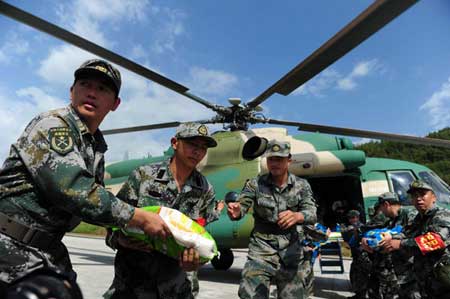 |
|
Soldiers from the Chengdu Military Command Area load a bag of rice onto a helicopter heading to quake-hit areas in Lushan, Sichuan province, on Wednesday. GUO LILIANG / FOR CHINA DAILY |
|
Knowing I am covering the earthquake in the epicenter, a lot of friends have shown deep concerns for me, and I really appreciate that. But reporters are creatures bursting with curiosity and always eager to be at the front. For reporters, covering disasters is more like an opportunity rather than a risk. It is hard to control your ego while you are flooded with people calling you brave and righteous. Reporters are just human beings. But you have to control it. The worst situation would be that you become narcissistic before you arrive at the disaster area. I have constantly been reminding myself: why am I here? I am a reporter. I am here to cover the news. My work should always come first, and the personal experience second. I am not saying that reporters should not share their private thoughts, as long as those feelings are meaningful for the audience. I believe the point of our "Reporter's Log" is to give readers an opportunity to see the quake zone through our eyes. It's not meant to be a forum for boasting about how much we've suffered. We have suffered, of course: cold weather, hunger, fatigue and danger. But am I afraid? Not at all. Not when I traveled to the epicenter, not when I was dodging falling rocks. I did panic for a few seconds during an aftershock on Sunday, the second day after the magnitude-7 earthquake. It was the first time I had experienced an earthquake. The earth was shaking, and so were the buildings around me. But I soon became numb to all the aftershocks, just like the survivors. The aftershocks kept happening, but it didn't interrupt people from going about their daily lives. To be honest, some of my colleagues in the disaster zone have had faced more difficulties than me, not to mention the people who lost their families and homes in the tragedy. Some reporters who arrived at the area earlier than me woke up in sleeping bags soaked with rainwater. I don't have any reason to show any self-pity, although I posted a few status updates on my social networking page. I could not help it. But what is worse than showing off is being more of a hindrance than a help. When your heroism overpowers your professionalism, you are more of a nuisance. There are some enthusiastic volunteers whose presence in the area has added to the difficulties that rescue workers face. In one instance, rescuers received a message from a volunteer who was lost and asked for help. Rescuers hurried to the spot where the volunteer said he got lost, but by the time they arrived he sent another message saying he had found his way out of the mountains and didn't need their help anymore. Another volunteer I met wearing ripped jeans said she planned to walk 10 kilometers to get to the epicenter. I didn't think she would make it. A middle-aged man sought attention from the national media, claiming he had been here to help since the earthquake struck. He showed them a file full of newspaper clippings of his stories. I am not saying they don't have a right to be here, to take pictures and get raw materials. But the question is: how much can you help? Are you the right person to help? There was one guy I liked. Brother Chen, a Sichuan resident and a veteran, participated in the rescue work after a devastating flood in 1998 and the Sichuan earthquake in 2008. He was quiet and had no interest in socializing. He was more capable than many amateur rescuers, but he chose to spend his time driving rescue crews around the area. It was a boring job compared with digging people out of the debris, but one that needed to be done. As for reporters, our job is not easy, but we are more of a nuisance in many cases. To cover a story about high school students going back to class, at least 30 reporters squeezed into a classroom with 110 students. They asked questions, cracked the shutters and the lights from their cameras bothered the students. The teachers eventually asked the reporters to leave. How do you pick the right time, location and angle for a story? How do you write a story that is not a cliche? How do you spot a problem that has been ignored? How do you find a story that hasn't been told? It takes time, strength and patience. It takes ethics and talent. In a word: professionalism. I was really worried about being a burden rather than a helper. In the end, many thanks go to my editors and other reporters based in Beijing. We had the cool experience, while they worked long hours fixing our stories. Every time I see my story in the newspaper, I am filled with gratitude. |
大家知道我来震区报道,都说要注意身体注意安全。这是朋友的关心。 可对于记者这种充满好奇心、总是渴望抵达现场的物种来讲,出发的冲动往往多过这些忧虑,所以,是冒险,更是成全。或者说,冒险成全都有,比例自知。 只是,当你收到他人的祝福与赞赏时,虚荣心很难完全安分。人嘛。 但若是意识到这趟差本也是一种成全,那自我感动和自我表扬就一定得收着点。最怕的是人还没到,自我陶醉已经开始。 时刻提醒自己,为什么去?去当记者的,写新闻。工作第一,体验第二,体验也是为工作服务的。 自己到见闻和经历也不是不能分享,但关键是对公众有没有价值?报社让写reporter's log,我们的出发点也是通过个人观感反映震区情况,而非个人艰险。 当然,说不累不饿不冷不险也是假的。怕么?说实话出发时完全没有。(reporters always up for adventure!)上宝兴时,最后徒步在几个关卡与流沙碎石赛跑时也顾不上怕。 不过21号下午的强余震时真心慌了几秒,从小到大第一次感受到地震,脚底下站不稳,眼前的房子也晃了。可再后来,就习惯了,麻木了。聊着聊着就震了,继续聊。灾区人民就是这么过来的。 就算突破了自我,但扪心自问,比起冒着更大风险更早进入的同行们,比起一觉醒来被雨打湿的同事们,自己的处境还算好的。 和灾区伤亡和无家可归的群众们,就更不能相提并论。 所以特别怕自己矫情,怕露怯。(虽然hold不住的时候还是忍不住发了几条朋友圈) 露怯事小,添乱事大。 自我感动就容易让英雄主义盖过专业主义。就容易添乱。 志愿者添乱的事儿大家听说了。 那天听一个志愿司机说有志愿者上山,结果被困,四处发信息求救,结果很多专业队员过去,结果他自己已经出来,消耗可很多救援力量。 穿着破洞牛仔裤的女生搭摩托进宝兴的我也见了,还说第二天要徒步十公里下乡。呵呵。 还看到有一个陕西来的中年男性,说自己第一天就进来了,四处找陕西媒体,又拿出来一个整理的特别好的夹子,都是他过往的报道集,说中央媒体也该关注他。 不是说不能自我成全,不是不能留影,不是不能挣谈资,但问题是你到底能帮上多大忙?是不是最适合帮这个忙的人? 最欣赏是陈哥。四川人,退伍兵,参加过98抗洪,汶川援救,不吵吵,不扎堆。要说能力肯定比很多没有经验的志愿者强多了,但他选择给红十字的蓝天救援队调配志愿车辆,因为这活儿需要人做。他也做的好。 记者耽误事儿的说法也有了。 替大家说一句话,很多人,真的不易。但扎堆也是真的。 24号上午宝兴中学高三复课,第一节心里课,到了110多个学生,记者差不多也有30-40,闪光灯不停,最后让老师劝出来了。 怎样选择报道时间、地点、角度?如何差异化报道?如何发现没发现的问题?讲述未讲述的故事?这需要精力体力心力,需要节操,更需要能力。 说到底,还是专业二字。不怕日日冷饿困,就怕自己武器钝。没写好稿子,还耽误救援。惴惴不安。 也不敢忘记,稿子不仅仅是前线的功劳,体验让我们占了,风头让我们抢了,入夜我们睡了,擦屎擦尿的是后方,加班加点的是后方。每次稿子出来之后,真心欣慰和感激。 相关阅读 (中国日报记者:唐跃 本文为编译,英文原文刊登于4月25日版《中国日报》) |